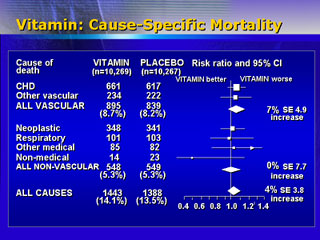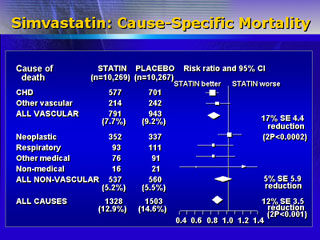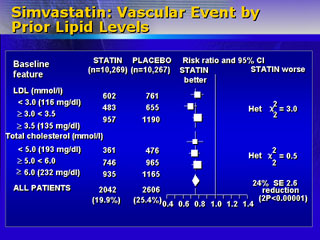|
Investigators reported a large, randomized,
five-year study including more than 20,000 individuals at high cardiovascular
risk. Treatment with the lipid lowering drug simvastatin 40 mg/day
reduced the incidence of major vascular events by one-third. Surprisingly,
even individuals with low cholesterol had a treatment benefit of
this magnitude. Antioxidant vitamin supplementation did not reduce
major vascular events.
The long-term benefits of a cholesterol-lowering drug therapy are
uncertain for patients at high risk of cardiovascular disease. Another
unresolved question is whether antioxidant vitamin supplementation
helps or harms these patients.
The Heart Protection Study addressed these questions in a cohort
of 20,536 patients from 69 centers. Investigators randomized patients
to simvastatin 40 mg/day or placebo. In addition, they allocated
half of each patient group to receive a vitamin cocktail (vitamin
E, vitamin C, and beta-carotene) or placebo capsules.
They enrolled a wide range of high-risk patients, including those
with coronary disease, other occlusive arterial disease, diabetes,
and hypertension. This population included many women, elderly individuals,
and patients with acceptable cholesterol levels. Little data exists
regarding the value of treatment for these groups.
Despite 5.5 years of treatment, vitamins provided no clinical
benefit, although there was no evidence of harm. The conclusion
is that these patients can take vitamins, if they wish, without
worrying about safety.

Statin treatment resulted in large mean reductions in serum total
cholesterol levels (1.3 mmol/L) and LDL cholesterol (1.0 mmol/L).
Remarkably, cholesterol-lowering therapy reduced the risk of major
vascular events by at least one-quarter for every patient group
(that reduction was actually one-third when non-compliant patients
were excluded).
The Heart Protection Study showed for the first time definitive
evidence that statin therapy is beneficial in patients with diabetes,
even if they did not have substantial risk of coronary heart disease.

It is also the first large study of a cholesterol-lowering regime
in women (about 5,000 women participated in the study). According
to Dr. Collins, physicians now have direct evidence that statins
reduce the risk of events by at least one-third in women.
Perhaps the most remarkable finding is that these high-risk individuals
had a benefit regardless of their serum cholesterol level. Investigators
observed a reduction in vascular events of at least one-third for
both low-to-normal and high cholesterol patient groups.

This finding could have enormous policy implications. Experts
at the AHA meeting said that perhaps physicians should not wait
to initiate cholesterol lowering at specific targets levels of serum
cholesterol. Instead, they could begin treatment of high-risk patients
irrespective of starting cholesterol level. This approach would
simplify therapy enormously.
|